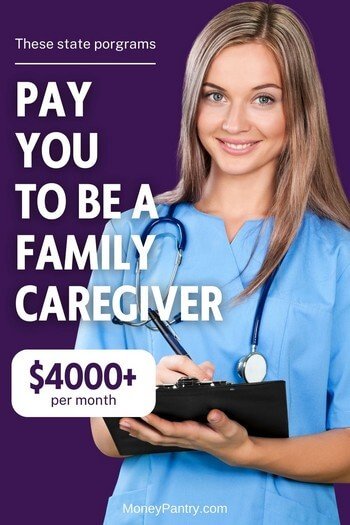
Caregiving, although rewarding, can be a difficult job. It can be hard to make ends meet while you’re also dedicating your time to caring for someone.
There are, fortunately, a few ways that you can get paid to care for someone. This includes government programs like state Medicaid programs, long-term care insurance, veteran programs, caregiver contracts, and state programs.
In today’s post, we’ll cover the options caregivers have to get paid in their state.
We’ll also provide helpful resources that you can use to find paid caregiver programs in your state. Basically, we’ll point you in the right direction so you can get the money you’re entitled to.
Table of Contents
Ways to Get Paid for Being a Family Caregiver
In this section, I’ll cover 6 ways you can get paid for being a family caregiver.
FreeCash: Get paid up to $497.82 per offer – test apps, play games, and complete surveys for fast cash! Start earning today!
Earn Haus: Earn up to $25 per survey, plus get paid the same day via PayPal, Venmo, or check! Join Earn Haus now!
InboxDollars: Over $57 million paid to members for watching videos, shopping, and completing surveys. Claim your $5 bonus instantly when you join!
Product Report Card: Get paid to review products from home (payouts from $0.50 to $500)! Join for Free!
KashKick: Earn money watching videos, shopping, surfing the web, and more – PayPal payments are fast! Start earning with KashKick now!
Swagbucks: Watch videos, shop online, take surveys, and more – get $10 instantly when you sign up! Join now and start earning!
There are lots of options including Medicaid programs, and long-term care insurance, and we’ll cover them below.
Please note that programs vary widely from state to state. That’s why I haven’t gone into extensive detail about each option. What’s available in one state, may not be in another. Also, eligibility requirements can vary.
Instead, I’ve included a brief description of each option and have then included resources where you can find information that’s specific to your state. Basically, you have the links you need to get started!
1. State Medicaid Programs
In some states, there are programs that pay family members to provide care to those who receive Medicaid (this program may go by a different name in your state). These programs can vary, as can their criteria for eligibility.
So, if you are caring for someone with a disability that already receives Medicaid, then your state may allow you to become a paid caregiver.
Many states call this a consumer-directed personal assistance program.
Each state has different requirements and rules.
- You should contact your State’s Medicaid office for more information.
2. Long-term care insurance
Some long-term care insurance policies will allow family members to get paid as caregivers. You will need to contact your insurance agent and ask for a written confirmation of benefits.
- You can learn more about long-term care insurance here.
3. Veteran-Directed Home and Community-Based Services Program
The Veteran-Directed Home and Community-Based Services program offers veterans a flexible budget. With the help of a counselor, veterans may be able to hire a family member to help with daily living and activities.
So, if you are a caregiver for a veteran or a veteran who requires a caregiver, then the program may be able to help you.
Advertisements
The program is for veterans who need personal care services and help with activities of daily living, such as help with bathing, dressing, or fixing meals.
Veterans in this program are given a budget for services that are managed by the veteran or the veteran’s representative. With the help of a counselor, Veterans hire their own workers to meet their daily needs to help them live at home or in their community.
- You can learn more about the Veteran-Directed Home and Community-Based Services program here.
4. Aid and Attendance Benefits program
The Aid and Attendance Benefits program provides monthly payments in addition to a monthly VA pension for qualified veterans and survivors. These benefits can help to cover the costs of a caregiver, who may be a family member.
- You can learn more about the Aid and Attendance Benefits program here.
- Veterans can find the VA pension management center in their area to see if they qualify.
5. Set up a caregiver contract
If the person who requires care is mentally sound and has the financial resources, then that person can choose to pay a family member for the same services that a professional home health care worker would provide.
If you and a family member are considering this route, then consider taking these steps to make things easier:
Discuss the arrangement
If you are going to be a caregiver for a family member, then you need to discuss the arrangement. Talk about what you both need. You should discuss things like wages and paydays, scheduling, health risks, and how respite care and caregiver sick days will be handled.
Draw up a personal care agreement
You’ll need to draw up a personal care agreement. This will serve as a contract between the caregiver and the care recipient.
It should list things like wages, what services will be provided and when, the length of the agreement and other terms.
Family Caregiver Alliance has an article all about personal care agreements, which you can read here to learn more.
Consult an elder care lawyer
You should also consult an elder care lawyer to review your contract to ensure that it meets tax requirements and deals with inheritances. Any other interested parties, like siblings, may also need to approve it.
If family members seem uncomfortable with the arrangements or disagree with the plan, you could always consider a session with a neutral party, like a family therapist or family mediator who specializes in elder care.
Keep professional records
Caregivers should ensure they keep professional records that specify the dates of work, services performed, and the amount paid. This paperwork is essential if your family member later applies for Medicaid. During the qualification process, a caseworker will examine records for the past five years.
Report income
Like with any paid job, caregivers are required by law to report wages as taxable income. If at a later date, your family member becomes eligible for Medicaid, but your taxes have not been paid, Medicaid will consider the money a gift, not an expense.
This could prevent your family member from qualifying for Medicaid. On the other hand, the Internal Revenue Service is clear – when services are provided, all money received is a wage, not a gift.
6. State programs
Not everyone is eligible for Medicaid. In that case, special state programs should be considered. Some states may have similar programs that pay family caregivers, but for people who aren’t eligible for Medicaid, or who have specific conditions like traumatic brain injury.
Contact your local Medicaid office or the state Department of Health to find out if there are any special programs that the person who requires care may qualify for.
You can contact your local Area Agency on Aging and ask them to direct you to the correct government office.
In the section below, I’ve listed lots of resources to help you get started with finding programs in your specific state, so do have a look at those links.
How to Find Paid Caregiver Programs in Your State
Knowing how to get paid to take care of family can be hard. There are so many different programs, which vary from state to state.
In this section, I’ve given you links to some great resources which can help you to find programs for caregivers in your particular state. This can be really useful if you’re not sure what types of paid caregiver opportunities are available in your area.
Have a look at these resources if you want to get paid to take care of family in your state.
Contact your local Area Agency on Aging
Your local Area Agency on Aging may be able to give you information on whether or not your state’s Medicaid program will pay a family member to provide care to a Medicaid recipient. It may also be able to direct you to resources where you can find programs for those who don’t qualify for Medicaid.
- You can find your local Area Agency on Aging here.
Use the Family Caregiver Alliance’s Family Caregiver Services by State tool
The Family Caregiver Alliance has a Caregiver Services by State tool that you can use to find resources in your state. It helps family caregivers to locate public, nonprofit, and private programs and services near their family members.
You can find resources in your state. Check out the section, “Caregiver Compensation” for agencies that have programs that enable the care recipient to hire a family member to care for them.
- You can use the Family Caregiver Alliance Family Caregiver Services by State tool here.
Paying For Senior Care’s Paid Caregiver Program locator
Paying for Senior Care has a Paid Caregiver Program Locator that you can use to find programs. It provides a list of state Medicaid and non-Medicaid programs with consumer direction.
Consumer direction programs give seniors a direct cash allowance and allows them to spend it on their preferred care providers and services. These programs enable seniors to determine who will be paid to care for them, including a family member.
- You can use the Paying for Senior Care Paid Caregiver Program locator here.
Use BenefitsCheckUp to check benefits eligibility
BenefitsCheckUp is an online tool that connects older adults and people with disabilities to benefits. The tool makes it easy to see if you’re eligible for benefits and then helps you to find out where to apply online or how to get help from a benefits counselor.
The tool can help you to assess whether you can get help from programs before you apply. Those who’re interested in finding out about programs can answer questions anonymously to find out if they are eligible for key benefits programs.
- You can use BenefitsCheckUp here.
Find services for older adults and their families at Eldercare Locator
The Eldercare Locator is a public service of the U.S. Administration on Aging. It helps to connect people to services for older adults and their families.
- You can find help in your community by entering your zip code or city and state on the website here or by calling 1-800-677-1116.
Family Caregiver Pay Rate
At this point, you may be wondering just how much do family members get paid for caregiving.
The pay rate for family caregivers varies depending on the state and the specific program or assistance they are eligible for.
In some cases, family caregivers may receive financial compensation through Medicaid or other state-funded programs, while in others, the compensation may come from other sources or private arrangements.
It’s important to research the specific programs available in your state and consult with relevant agencies to understand the pay rates and requirements for family caregivers.
As for exact dollar amounts, according to Care.com data as of 8/26/2022, it generally starts from just under $3000 a month in states like Louisiana, Alabama and Mississippi and goes as high as $42000 in states like North Dakota, Massachusetts, Hawaii and Alaska and West Virginia.
Closing Thoughts
Becoming a family caregiver can be a rewarding experience, but it’s essential to understand the available support and compensation options. Be sure to explore state programs and resources that may provide financial assistance and resources to help you in your caregiving journey.
Taking care of someone you love is valuable work, and seeking the right support can make the process more manageable. So you can enjoy the work while getting paid to take care of a family member.




Share your thoughts